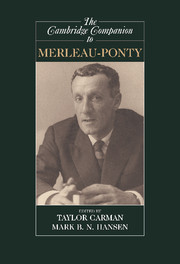Book contents
- Frontmatter
- Introduction
- 1 Merleau-Ponty and the Epistemological Picture
- 2 Sensation, Judgment, and the Phenomenal Field
- 3 Seeing Things in Merleau-Ponty
- 4 Motives, Reasons, and Causes
- 5 Merleau-Ponty and Recent Cognitive Science
- 6 The Silent, Limping Body of Philosophy
- 7 Merleau-Ponty and the Touch of Malebranche
- 8 A Phenomenology of Life
- 9 The Embryology of the (In)visible
- 10 Merleau-Ponty’s Existential Conception of Science
- 11 Between Philosophy and Art
- 12 Understanding the Engaged Philosopher: On Politics, Philosophy, and Art
- 13 Thinking Politics
- References
- Index
12 - Understanding the Engaged Philosopher: On Politics, Philosophy, and Art
Published online by Cambridge University Press: 28 May 2006
- Frontmatter
- Introduction
- 1 Merleau-Ponty and the Epistemological Picture
- 2 Sensation, Judgment, and the Phenomenal Field
- 3 Seeing Things in Merleau-Ponty
- 4 Motives, Reasons, and Causes
- 5 Merleau-Ponty and Recent Cognitive Science
- 6 The Silent, Limping Body of Philosophy
- 7 Merleau-Ponty and the Touch of Malebranche
- 8 A Phenomenology of Life
- 9 The Embryology of the (In)visible
- 10 Merleau-Ponty’s Existential Conception of Science
- 11 Between Philosophy and Art
- 12 Understanding the Engaged Philosopher: On Politics, Philosophy, and Art
- 13 Thinking Politics
- References
- Index
Summary
It is true, as Marx says, that history does not walk on its head, but it is also true that it does not think with its feet.
Merleau-PontyCHALLENGING COMPANIONS
In The Cambridge Companion to Sartre, Rhiannon Goldthorpe entitles her essay on aesthetics and politics “Understanding the Committed Writer.” Similarly can we entitle this essay in The Cambridge Companion to Merleau-Ponty, although there is a difference. Whereas Sartre strives to be a committed writer as philosopher, playwright, and political “man of action,” Merleau-Ponty strives to be an engaged philosopher. Whereas, from Merleau- Ponty's perspective, Sartre thinks about commitment as neutral between roles, Merleau-Ponty regards engagement as role-dependent. Whereas Sartre thinks about commitment as one's taking sides in politics, Merleau-Ponty argues for the philosopher's engagement with truth. Characteristically, Merleau-Ponty writes, “One must be able to withdraw and gain distance in order to become truly engaged, which is, also, always an engagement with the truth” (EP 60-1/60).
This essay is about Merleau-Ponty’s lifelong intellectual companionship with Sartre. It is also about the challenging companionship between the politician, the philosopher, the playwright, and the painter. Most specifically, it is about how Merleau-Ponty allowed his engagement as philosopher to determine and reflect his engagement with politics and the arts.
- Type
- Chapter
- Information
- The Cambridge Companion to Merleau-Ponty , pp. 318 - 351Publisher: Cambridge University PressPrint publication year: 2004
- 1
- Cited by

